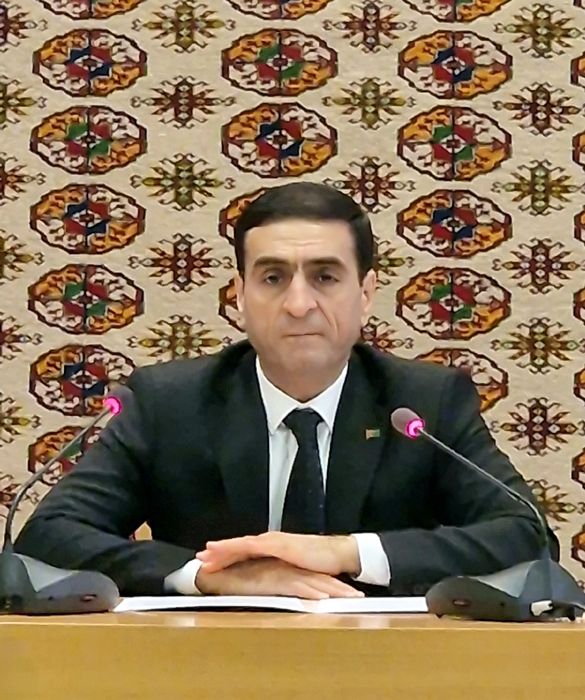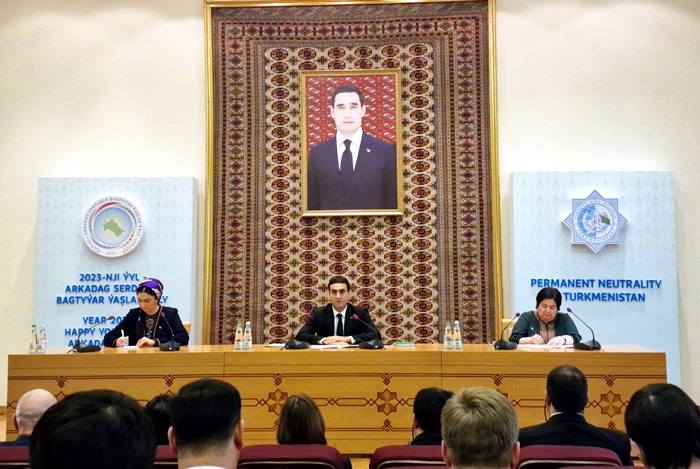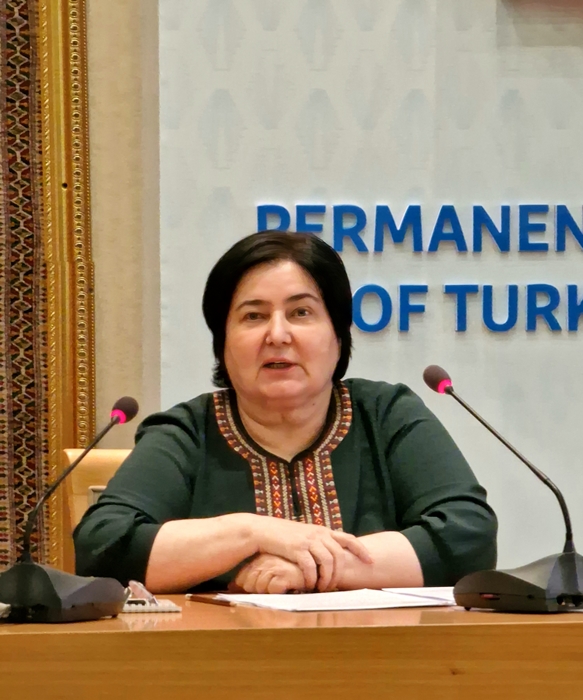nCa Report – Elvira Kadyrova and Ravilya Kadyrova
Highlights
- Interactive Dialogue in Geneva formulated 228 recommendations on human rights policy
- Turkmenistan is systematically working to implement recommendations in the field of human rights
- Legal reforms in Turkmenistan – consolidation of the international legal framework of obligations
- Situation of women in Turkmenistan – reality destroys stereotypes
- The Government of Turkmenistan has never encouraged the practice of forcing cotton harvesting
- In fact, Turkmenistan is already implementing a number of recommendations
- Rights of persons with disabilities will be secured by a new law
- How does Turkmenistan plan to implement the recommendations on human rights?
On 16 November 2023, the Ministry of Foreign Affairs of Turkmenistan hosted a briefing on the participation of the Turkmen delegation in the 44th session of the Working Group of the Universal Periodic Review (UPR) of the UN Human Rights Council, which was held in Geneva from 6 to 17 November 2023.
The briefing was attended by the heads of the Ministry of Foreign Affairs of Turkmenistan, employees of diplomatic missions of foreign states and representative offices of international organizations accredited in Turkmenistan, as well as foreign and Turkmen journalists.
During the session, the delegation of Turkmenistan presented a comprehensive report outlining the country’s policy directions and progress in addressing human rights concerns identified during the previous Universal Periodic Review in 2018.

The delegation of Turkmenistan was headed by Deputy Minister of Foreign Affairs Vepa Hajiyev.
During the briefing, Hajiyev drew attention to some aspects of the report presented by Turkmenistan, and also spoke about the specifics of implementing recommendations for further improvement of the country’s policy in the humanitarian dimension.
Hadjiev emphasized the collaborative nature of the report’s preparation, involving representatives from approximately 30 ministries, departments, and public organizations under the Interdepartmental Commission on the Implementation of International Obligations in the Field of Human Rights.
During the UPR in Geneva, the Turkmen delegation provided an update on the country’s ongoing reform initiatives and long-term national programs aimed at strengthening state institutions, diversifying the economy, and addressing key social tasks. The delegation also highlighted the cross-sectoral approach to the dialogue in the context of implementing the Sustainable Development Goals (SDGs), specifically informing the UN Human Rights Council about the development of a national SDG data collection and dissemination platform.
Interactive Dialogue in Geneva formulated 228 recommendations on human rights policy
Following the interactive dialogue, a total of 228 recommendations on human rights policy were formulated. Based on the information provided by the Turkmen delegation and the report submitted in advance, 77 countries responded with recommendations and assessments on further improving human rights policy in Turkmenistan.
Out of the 228 recommendations addressed, 146 were accepted by the Turkmen side for implementation, and 82 were taken into account for consideration in subsequent work.
Notably, Turkmenistan did not reject any recommendations, demonstrating a commitment to engaging in constructive dialogue and addressing human rights concerns.
As Deputy Foreign Minister Hadjiev explained, taking note of the recommendations means that Turkmenistan will commence a comprehensive assessment of the feasibility of implementing any steps in these areas. The Turkmen side will actively study these 82 recommendations to determine the appropriate follow-up actions required to create the necessary conditions for their implementation in Turkmenistan.
Hadjiev emphasized that some recommendations necessitate further preparatory work, including conducting training sessions, seminars, seeking expert opinions, and evaluating the adequacy of the legal framework.
“We invite interested parties, both states and international organizations, to continue active cooperation in the field of human rights,” the Deputy Minister said.
Turkmenistan is systematically working to implement recommendations in the field of human rights
Turkmenistan has transitioned to a systematic approach to implementing human rights recommendations since 2018, aiming to enhance the accountability of state structures in fulfilling their international obligations. As a result, compared to the previous UPR cycle, the number of implemented recommendations has increased by one and a half times in the current cycle.
The conduct of the population and housing census in Turkmenistan in December 2022 facilitated in a valuable way the analysis of statistical indicators. The census data served as an integral information base for the formulation of programs and strategies aimed at the country’s socio-economic development.
The President of Turkmenistan’s program on socio-economic development for 2022-2028 has played a positive role in fulfilling international obligations with regard to improving social conditions and upholding the civil and political rights of the country’s population.
In 2018-2023, several national action plans have been approved and are currently being implemented. These plans were developed in consideration of previous recommendations received through the UPR. Notably, the recommendations concerning gender equality, children’s rights, combating human trafficking, and the elimination of statelessness were carefully studied, leading to the decision to develop comprehensive national programs to address these issues.
Legal reforms in Turkmenistan – consolidation of the international legal framework of obligations
From 2018 to 2023, Turkmenistan adopted new legislative acts to strengthen mechanisms for the protection and promotion of human rights, and made amendments and additions to existing legislation.
In particular, based on the recommendations of the International Labour Organization (ILO), provisions that restricted women’s labor rights in jobs with harmful and difficult working conditions were removed from the Labor Code of Turkmenistan. This change is a significant step towards ensuring gender equality and protecting women’s rights in the workplace.
Furthermore, the new version of the Criminal Code of Turkmenistan criminalizes direct or indirect violation or restriction of human rights and freedoms. This change applies regardless of nationality, skin color, gender, origin, property and official status, place of residence, language, attitude to religion, political beliefs, or any other circumstance.
These ongoing reforms are a direct result of the recommendations made during the 2018 Universal Periodic Review process.
In addition, work is underway on Turkmenistan’s accession to various international documents. In particular, in the period from 2018 to 2023, Turkmenistan joined the following international instruments:
- ILO Convention No. 144 on Tripartite Consultations to promote the implementation of International Labour Standards
- he Marrakesh Treaty to Facilitate Access to Published Works for Persons Who Are Blind, Visually Impaired or Otherwise Print Disabled
- Convention against Discrimination in Education
- Convention No. 122 on Employment Policy
- Act on Amendments to the ILO Constitution
- Convention on the Recognition of Qualifications Concerning Higher Education in the European Region
Also, national legislation is monitored for its compliance with the provisions of international documents, the study of the provisions of international documents, as well as the mechanisms of accession to them.
Situation of women in Turkmenistan – reality destroys stereotypes
The Turkmen delegation’s report within the UPR framework highlights the substantial efforts undertaken to expand women’s involvement in all aspects of the country’s socio-political life.
As Deputy Foreign Minister Hajiyev emphasized during the UPR, questions were raised regarding women’s dress code, cosmetology standards, and obtaining a driver’s license in Turkmenistan. In response, the Turkmen delegation provided compelling evidence demonstrating that several prevailing STEREOTYPES ABOUT WOMEN’S STATUS IN TURKMENISTAN ARE UNFOUNDED.
“There is no specific dress code or mandatory parade of clothing in Turkmenistan, except in higher educational institutions. This practice of regulating attire is not unique to Turkmenistan and is also found in other countries, including higher education institutions, schools, etc. In everyday life, our women are free to wear whatever clothing they choose, and the same applies to their appearance and beauty salons,” Hajiyev stated.
During 44th Session of Universal Periodic Review, the internal ministry of Turkmenistan presented statistics on the number of driver’s licenses issued to women. Between 2018 and 2023, 9,721 driver’s licenses were issued to women in Turkmenistan.
Another recommendation addressed the need for increased representation of women in leadership positions and entrepreneurship, which is actively being addressed through ongoing initiatives.
“Despite the fact that it is customary to determine quotas according to international standards, this process is being carried out on a voluntary basis, due to the fact that the level of education of our women is increasing from year to year, this is the level of education not only in the humanitarian sphere, but also in technical specialties”, said the Head of the Department of Democracy and International Relations of the Institute of State, Law and Democracy of Turkmenistan Shemshat Atajanova, Secretary of the Interdepartmental Commission on Ensuring Compliance with Turkmenistan’s international obligations in the field of human rights and International humanitarian law.
The level of representation of women in the Parliament of Turkmenistan is 26.6% and this percentage is formed without quotas, she added.
Furthermore, women hold prominent positions within political parties and serve as deputy heads of regional administrations for cultural affairs.
Atajanova particularly highlighted the 2020 sample survey on the health and status of a woman in the family, conducted jointly with UNFPA in Turkmenistan. This survey was conducted in response to a significant number of recommendations received during the UPR and the CEDAW Committee (Committee on the Elimination of Discrimination against Women) review.
An Interdepartmental Working Group was established to oversee the survey’s preparation and coordination. The Working Group comprised representatives from the Ministries of Health and Medical Industry, Internal Affairs, Labor and Social Protection, the State Statistics Committee, the Institute of Democracy and Human Rights, and the Union of Women of Turkmenistan.
“This group continues to operate to this day and actively implements the recommendations derived from the survey’s analytical report,” Atajanova stated.
The Government of Turkmenistan has never encouraged the practice of forcing cotton harvesting
Inspectors and representatives from the ILO visited Turkmenistan and toured some cotton fields, at their request. They interviewed representatives from private and public entities, as well as doctors and teachers, stated Deputy Foreign Minister Vepa Hajiyev.
Hajiyev told that during the recommendation statements, stereotypes about mass violations of workers’ rights, forced cotton picking, and child labor persist.
“The essence of the problem is that it exists in all countries. The extent, scope, and state responsibility for eradicating such issues are entirely different questions. The government does not, has not, and will not encourage such practices. There were calls to increase the accountability of local authorities to prevent such violations and to raise awareness among the local population about their labor rights. Naturally, we will continue this work,” Hajiyev assured.
In fact, Turkmenistan is already implementing a number of recommendations
Continuing the discussion on recommendations, Atajanova, who was also part of the delegation in Geneva, emphasized that many recommendations are already being implemented in Turkmenistan.
One example is the recommendation concerning the monitoring of national human rights action plans. Atajanova explained that this work has been systematically carried out for several years, involving the assessment of national action plans for gender equality and child rights. Based on these assessments, subsequent plans are developed and adopted.
Rights of persons with disabilities will be secured by a new law
Turkmenistan also intends to draft an independent law on the rights of persons with disabilities, in response to earlier recommendations.
“While the rights of persons with disabilities are already considered in various legislative acts, such as the Social Protection Code, the Family Code, the Labor Code, the Tax Code, and the Law on Social Services, there is a need for a dedicated law to comprehensively address their rights,” Atajanova went on saying.
How does Turkmenistan plan to implement the recommendations on human rights?
As announced during the briefing, Turkmenistan will officially receive the recommendations formulated within the framework of the UPR in January 2024.
Following the receipt of these recommendations, Turkmenistan will engage in close collaboration with UN agencies to develop a roadmap or other guiding document. It will clearly define the priorities for the implementation of the 146 supported recommendations and identify the ministries and departments responsible for spearheading this work. The Constitution of Turkmenistan, national legislation, and open, constructive cooperation with all interested parties will serve as the guiding principles for these upcoming activities.

///nCa, 17 November 2023
#foreign_ministry, #Turkmenistan, #briefing, #human_rights_in_Turkmenistan, #Universal_Periodic_Review


